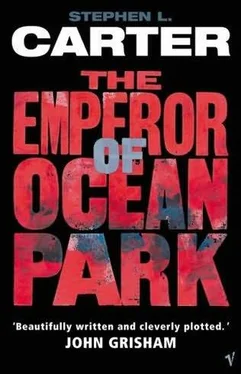Stephen Carter - Emperor of Ocean Park
Здесь есть возможность читать онлайн «Stephen Carter - Emperor of Ocean Park» весь текст электронной книги совершенно бесплатно (целиком полную версию без сокращений). В некоторых случаях можно слушать аудио, скачать через торрент в формате fb2 и присутствует краткое содержание. Жанр: Криминальный детектив, на английском языке. Описание произведения, (предисловие) а так же отзывы посетителей доступны на портале библиотеки ЛибКат.
- Название:Emperor of Ocean Park
- Автор:
- Жанр:
- Год:неизвестен
- ISBN:нет данных
- Рейтинг книги:3 / 5. Голосов: 1
-
Избранное:Добавить в избранное
- Отзывы:
-
Ваша оценка:
- 60
- 1
- 2
- 3
- 4
- 5
Emperor of Ocean Park: краткое содержание, описание и аннотация
Предлагаем к чтению аннотацию, описание, краткое содержание или предисловие (зависит от того, что написал сам автор книги «Emperor of Ocean Park»). Если вы не нашли необходимую информацию о книге — напишите в комментариях, мы постараемся отыскать её.
Emperor of Ocean Park — читать онлайн бесплатно полную книгу (весь текст) целиком
Ниже представлен текст книги, разбитый по страницам. Система сохранения места последней прочитанной страницы, позволяет с удобством читать онлайн бесплатно книгу «Emperor of Ocean Park», без необходимости каждый раз заново искать на чём Вы остановились. Поставьте закладку, и сможете в любой момент перейти на страницу, на которой закончили чтение.
Интервал:
Закладка:
“Please don’t talk that way,” Kimmer mumbles, shuddering. She does not object when I put my arm around her.
“Kimmer, listen to me. Listen, please. I’m not going to do anything foolish. There’s a piece of the mystery that hasn’t been solved yet. Everybody’s forgotten about it. But I haven’t. And I have to go and see.”
“Go and see what?”
I think about the shadows I have sensed, ponder how to put it. I think about the still-unexplained attack on me in the middle of the campus. I think about my bullet holes. I think about my chat with Mr. Henderson. From my memory I draw the Judge’s line: “The way it was before, darling. I have to see the way it was before.”
She licks her lips. She is wearing jeans and a polo shirt and is as fetching as ever. Her hair is awry, and I wonder, with distress, if she was too busy in bed last night to braid it. She shoves her glasses up on her forehead and asks only one question: “Is it going to be dangerous, Misha? For you, I mean.”
“Yes.”
CHAPTER 61
The hurricane hits on my second day in Oak Bluffs, and it is a triumph of a storm, one of the greats, a storm to be talked about for years to come, just as I hoped it would be. All morning the police go up and down the roads with megaphones, warning everyone living near the water to take shelter. The radio stations, both on the Island and from the Cape, predict horrific property damage. I stay in the house or on the porch, watching the storm arrive. By early afternoon, the wind has knocked down tree branches and power lines all over the Island, and my electricity is gone. I hear creaking up in the attic, as though the chimney is deciding whether to jump. A couple of decades ago, in a storm less severe than this one, the chimney fell over flat on the roof of the house. I open the front door. Rain forms a wet, shimmery shield just beyond the steps, as though to walk through the curtain would be to enter a magical world where leaves fly and lawn furniture tumbles aimlessly through the streets and trees crack sharply in two.
Still I wait.
No more cars on Ocean Avenue or Seaview, nobody playing in the park. As always, a few foolish souls are out walking along the seawall, perhaps waiting to see whether the storm surge will be high enough to wash them away. But they are no more foolish than Talcott Garland, Misha to his friends, sitting in the unboarded front window of his house in defiance of official orders to evacuate. Of course I cannot leave. I have planned for, searched for, hoped for this moment since the day I left the hospital and saw Kimmer standing militantly in the front hall of Number 41 Hobby Road and solved the mystery. I dared not let on, not to anybody, and only Dana even guessed that I might know. I cannot evacuate. I am waiting, waiting for the worst of the storm, waiting for the only instant since encountering Jack Ziegler in the cemetery when I can know, absolutely know, that I am alone. Nobody, I am betting, can maintain surveillance through a hurricane like this one.
At three-twenty, the storm surge strikes. Water careens over the seawall, carrying sand and seaweed and even fish onto Seaview Avenue. Another tree falls. I see a lone little car struggling along the road, but the wind turns it completely around, and the driver jumps out and flees. I watch to make sure he is not doubling back. I hear a terrible crack as a tree branch goes through a window of the house next door.
Still I wait.
Vinerd Howse is shadowy and shuddering. No power anywhere in the area. Nobody moving on the street. Not a car or a truck or an SUV Not a bicycle. I see, literally, zero people, and when I step out into the storm, stabbing the endless gray with the powerful light I bought on the mainland, I can see the boarded fronts of every house on Ocean Park. I play the light over windows and porches, over trees and the bandstand, looking for any sign of a lurking human.
Nothing.
I repeat the process on both sides of the house and in the back. My rain slicker does little to protect me as I cross our narrow yard, shining my light into neighbors’ windows.
I am alone. Everyone else in the world is sensible. The present moment belongs to the insane.
My moment.
Back inside, I leave my portable searchlight and pick up an ordinary flashlight. Passing the dining room, I see that silly Newsweek cover again: THE CONSERVATIVE HOUR. But not so silly after all. Perhaps the Judge kept it as a reminder. Of someone to whom he owed an apology of sorts. I remember the very different pictures on the wall in Thera’s foyer. The way it was before. Over and over again, my father used that line, drumming it into me. Hoping I would never forget.
I hurry to the second floor of the house, then pull down the ladder into the attic.
The low-ceilinged attic of Vinerd Howse is not a place to spend more than twenty or thirty seconds in the middle of the summer. Through some trick of physics-hot air rising, perhaps, or bad ventilation-the attic is stifling, the air all but unbreatheable, even when the rest of the house has cooled for the evening. In the hurricane, the air is even worse. Outside it is cold, but, in here, every step leaves me soaking with sweat. And I almost lose my nerve besides, because I can actually see the ceiling tremble. But the scholar in me takes over, fascinated by its chaotic movements. I have never seen a roof heaving and rippling, the very rafters shaking, the way I suppose they do in an earthquake.
I feel remarkably safe.
I begin to hunt around the cramped space. I know it is up here someplace. Hidden over the years by an accumulation of junk, but it is here. It has to be.
Uncle Derek, I am thinking. How could I have forgotten Uncle Derek? As Sally said, he gave me my name.
I stumble over trunks and aged crockery and lanterns, I sort through old clothes and older books, and I cannot seem to find it. Rain and wind crash against the lone window as though demanding entry. I hear a trickle or two and know the roof has sprung a leak. The room is not that cluttered, it is quite unlike the attic Mariah frequents down on Shepard Street: finding what I am looking for should not be this hard. I bark my shin on a wilted sofa, and marvel at the energy, and foolishness, required to get it up here. Under a coat, I find my old baseball mitt, which I had thought lost forever. I find a child’s notebook filled with scrawling pictures of lighthouses. Mine, too? Abby’s? I cannot recall. The chimney creaks. I find a beach umbrella that has not been opened in a decade or two, and a couple of beach towels that have gone about that long since being washed. I am ready to give up. Maybe my theory is wrong, maybe I am so far off base…
But I know I am right.
The way it was before.
B4. The first move of the Double Excelsior when the white side loses. Signifying, however, not a square on an imaginary chessboard in a cemetery, but a word. B4. Before.
The way it was before.
Meaning, before it all went bad.
But it didn’t go bad when my father left the bench. It went bad long before that. It went bad-so he kept saying, according to Alma-it went bad when he split with his brother for the sake of ambition. Uncle Derek, his younger brother, who gave me my nickname. Uncle Derek, the lifelong Communist who, late in his life, got big into nationalism. Not for him the peaceful protest- praying while the cops beat your head in, he used to call it-but fighting back. The armed struggle. When the Judge was not around, we all used to sit at Derek’s feet, enthralled, especially Abigail. Uncle Derek would preach activism, activism, activism. But only with the right ideology. He liked the Panthers, even if he thought their ideology was a little bit thin. He liked SNCC. But most of all, Derek admired the black Communists who were active in the struggle.
Читать дальшеИнтервал:
Закладка:
Похожие книги на «Emperor of Ocean Park»
Представляем Вашему вниманию похожие книги на «Emperor of Ocean Park» списком для выбора. Мы отобрали схожую по названию и смыслу литературу в надежде предоставить читателям больше вариантов отыскать новые, интересные, ещё непрочитанные произведения.
Обсуждение, отзывы о книге «Emperor of Ocean Park» и просто собственные мнения читателей. Оставьте ваши комментарии, напишите, что Вы думаете о произведении, его смысле или главных героях. Укажите что конкретно понравилось, а что нет, и почему Вы так считаете.












